Femia > Health Library > Getting Pregnant > Trying to conceive > 15 DPO: What to expect, and how to tell if you’re pregnant
15 DPO: What to expect, and how to tell if you’re pregnant
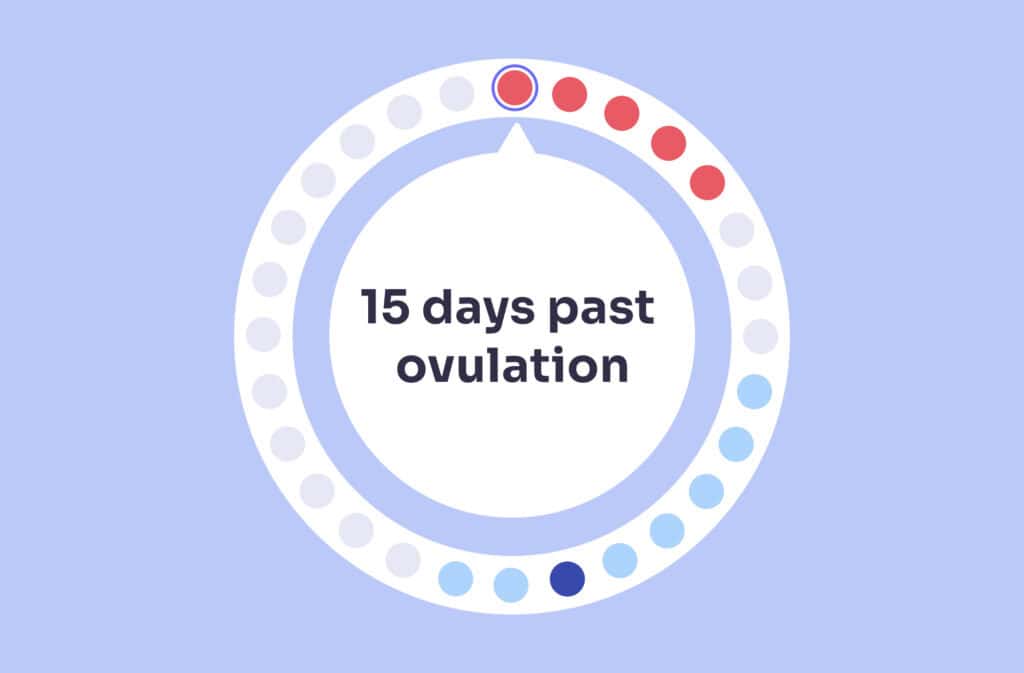
- Updated Feb 25, 2025
- Published
CRAFTED BY HUMAN
Crafted by human At Femia, we provide accurate and up-to-date information at every stage of your journey, from trying to conceive, pregnancy and postnatal support. All content is created by a real person based on in-depth research and own professional experience. Femia ensures that you will receive expert advice, strict accuracy and a personalized approach from our authors/medical experts. Learn more about our editorial policy.
FACT CHECKED
Fact checked At Femia Health, we maintain the highest standards of editorial excellence in delivering content focused on helping you conceive, guiding you through pregnancy, and supporting you postpartum. Explore our content review principles to learn how we ensure the accuracy and quality of our health and lifestyle tips for every stage of your journey.
At 15 DPO (15 days past ovulation):
- You’re past the typical luteal phase length. Your period is likely overdue if you have a regular 28-day cycle.
- If pregnant, hCG levels should be detectable by most pregnancy tests.
- Early pregnancy symptoms may be more pronounced.
- 15 DPO symptoms can be strong indicators of early pregnancy or an oncoming period.
Welcome to 15 DPO! You’ve journeyed through the two-week wait and are now at a pivotal moment. Whether you’re eagerly anticipating a positive pregnancy test or wondering about your late period, know that you’re not alone in this experience. Let’s explore what’s happening in your body and what signs you might be noticing at this significant time.
➡️ Read other Femia guides in this series:
- 1 DPO: What to expect, and how to tell if you’re pregnant
- 2 DPO: What to expect, and how to tell if you’re pregnant
- 3 DPO: What to expect, and how to tell if you’re pregnant
- 4 DPO: What to expect, and how to tell if you’re pregnant
- 5 DPO: What to expect, and how to tell if you’re pregnant
- 6 DPO: What to expect, and how to tell if you’re pregnant
- 7 DPO: What to expect, and how to tell if you’re pregnant
- 8 DPO: What to expect, and how to tell if you’re pregnant
- 9 DPO: What to expect, and how to tell if you’re pregnant
- 10 DPO: What to expect, and how to tell if you’re pregnant
- 11 DPO: What to expect, and how to tell if you’re pregnant
- 12 DPO: What to expect, and how to tell if you’re pregnant
- 13 DPO: What to expect, and how to tell if you’re pregnant
- 14 DPO: What to expect, and how to tell if you’re pregnant
- 16 DPO: What to expect, and how to tell if you’re pregnant
What does 15 DPO mean?
15 DPO stands for “15 days past ovulation.” At this point, you’re beyond the average luteal phase length, which typically lasts 12-14 days. For many women with a 28-day cycle, their period would have been expected a day or so ago.
This can be an emotionally charged time, filled with hope, anxiety, or a mix of both.
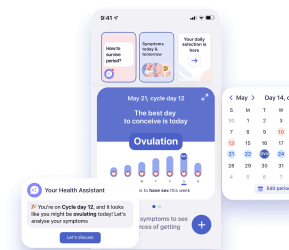
What's happening in your body at 15 DPO?
At 15 DPO, your body is likely in one of two states:
If pregnant:
- Hormone levels: hCG is rising rapidly, supporting early pregnancy development.
- Uterine changes: The uterine lining is maintained and continuing to develop to support the growing embryo.
- Early embryo development: The embryo is growing and developing quickly.
If not pregnant:
- Hormone levels: Estrogen and progesterone levels have dropped significantly.
- Uterine changes: The uterine lining is beginning to shed, leading to the start of your period.
15 DPO symptoms: What might you be experiencing?
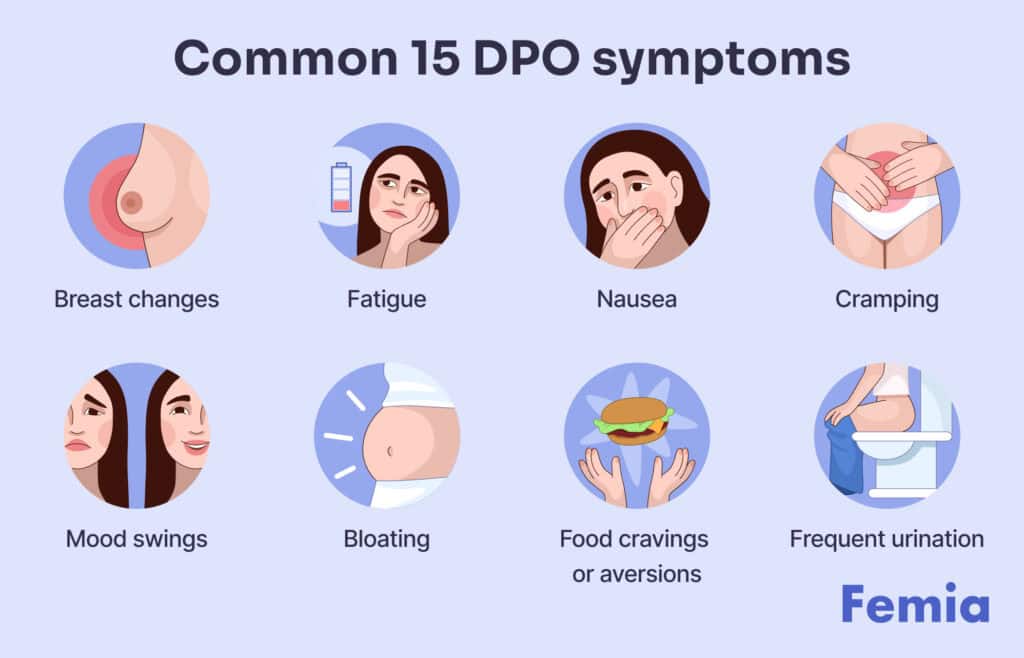
At 15 DPO, symptoms can be quite noticeable. Here’s what you might be feeling:
- Breast changes: Increased tenderness, swelling, or darkening of the areolas.
- Fatigue: You might feel more tired than usual, especially if pregnant.
- Nausea: Morning sickness may be starting for some women.
- Cramping: You might experience mild cramping, whether pregnant or about to start your period.
- Mood swings: Hormonal changes can lead to emotional fluctuations.
- Bloating: You might feel puffy or bloated in your abdomen.
- Frequent urination: This can be an early sign of pregnancy.
- Food aversions or cravings: These can start to appear in early pregnancy.
Remember, everyone’s body is different. You might experience all, some, or none of these symptoms. Trust your instincts and don’t hesitate to reach out to a healthcare provider if you have concerns.
15 DPO: Discharge if pregnant
At 15 DPO, pregnancy-related discharge often has these characteristics:
- Volume: Usually increased
- Consistency: Creamy or milky
- Color: Typically clear or white
- Odor: Mild or odorless
However, discharge can vary greatly among women and isn’t a definitive sign of pregnancy on its own.
👉Find out more: Evaporation line vs. faint positive: How to tell the difference on your pregnancy test
15 DPO: Cervical mucus
Cervical mucus at 15 DPO can provide clues about your body’s state:
- If pregnant: Often creamy, abundant, and white or yellow in color
- If not pregnant: May become thicker or decrease as your period begins
While these changes can be interesting to note, they’re not a reliable method to confirm or rule out pregnancy.
15 DPO: No sign of period
If you’re 15 DPO with no sign of your period, it could mean:
- Pregnancy: This is a common reason for a missed period at 15 DPO.
- Delayed ovulation: Your ovulation might have occurred later than usual this cycle.
- Hormonal imbalance: Stress, lifestyle changes, or medical conditions can affect your cycle.
If you’re trying to conceive, this can be an exciting yet anxious time. Consider taking a pregnancy test for more clarity.
How many weeks pregnant is 15 DPO?
If you’re pregnant at 15 DPO, you’re considered to be about 4 weeks and 1 day pregnant. This might seem confusing, but pregnancy is typically counted from the first day of your last menstrual period, not from conception.
Implantation bleeding 15 DPO
While 15 DPO is generally considered late for implantation bleeding, some women might experience light spotting at this time. This could be:
- Late implantation bleeding (though uncommon);
- Early pregnancy spotting;
- The start of your period.
15 DPO: Spotting
Spotting at 15 DPO could indicate:
- Early pregnancy: Light spotting can occur in early pregnancy.
- Start of menstruation: Your period might be beginning.
- Hormonal changes: Spotting can occur due to hormonal fluctuations.
If spotting is heavy or accompanied by pain, consult your healthcare provider.
👉Find out more: Ultimate pre-pregnancy checklist: Essential steps to take before having a baby
15 DPO: BFN success stories
While most pregnant women will get a positive test by 15 DPO, there are cases where women get a Big Fat Negative (BFN) at 15 DPO but later confirm pregnancy. This can happen due to:
- Late implantation;
- Low hCG levels;
- Less sensitive tests.
If you’ve gotten a negative test at 15 DPO but still feel you might be pregnant, try not to lose hope. Your journey is your own, and it’s not over yet. Consider waiting a few more days and testing again, preferably with your first morning urine.
Remember, while these “late positive” stories aren’t the most common, they do happen.
with confidence

Questions from the Femia community
I'm 15 DPO with no period, but my pregnancy test is negative. What's going on?
This can be a confusing situation. It's possible that you ovulated later than you thought, extending your cycle. It's also possible that you're pregnant but your hCG levels aren't high enough to detect yet. Wait a few days and test again. If your period doesn't arrive and you continue to get negative tests, consult with your healthcare provider.
Can stress delay my period even if I'm 15 DPO?
Yes, stress can indeed affect your menstrual cycle. It can delay ovulation, which in turn delays your period. If you've been under a lot of stress lately, this could explain a late period even at 15 DPO. However, if your period is more than a week late, it's a good idea to take a pregnancy test or consult with your doctor.
I'm experiencing some unusual cramping at 15 DPO. Should I be worried?
Cramping at 15 DPO can be normal, whether you're pregnant or about to start your period. If you're pregnant, it could be due to your uterus beginning to stretch. If you're not, it could be the start of menstrual cramps. However, if the cramping is severe or accompanied by heavy bleeding, it's best to consult with your healthcare provider.
The bottom line
At 15 DPO, you’re at a significant point where pregnancy can usually be confirmed or ruled out. If you’re trying to conceive, this can be an emotional time. Remember to be kind to yourself, whatever the outcome.
If you get a positive pregnancy test, congratulations! Consider scheduling an appointment with your healthcare provider to confirm the pregnancy and begin prenatal care. If your test is negative and your period arrives, it’s okay to feel disappointed. Each cycle is a new opportunity, and your body is doing its best.
Remember, every woman’s journey is unique. Whether you’re hoping for pregnancy or not, your feelings are valid. Don’t hesitate to seek support from loved ones or healthcare professionals if you need it. You’re doing great navigating this journey, and there’s a whole community here to support you. Keep taking care of yourself—you’ve got this!
➡️ Read other Femia guides in this series:
- 1 DPO: What to expect, and how to tell if you’re pregnant
- 2 DPO: What to expect, and how to tell if you’re pregnant
- 3 DPO: What to expect, and how to tell if you’re pregnant
- 4 DPO: What to expect, and how to tell if you’re pregnant
- 5 DPO: What to expect, and how to tell if you’re pregnant
- 6 DPO: What to expect, and how to tell if you’re pregnant
- 7 DPO: What to expect, and how to tell if you’re pregnant
- 8 DPO: What to expect, and how to tell if you’re pregnant
- 9 DPO: What to expect, and how to tell if you’re pregnant
- 10 DPO: What to expect, and how to tell if you’re pregnant
- 11 DPO: What to expect, and how to tell if you’re pregnant
- 12 DPO: What to expect, and how to tell if you’re pregnant
- 13 DPO: What to expect, and how to tell if you’re pregnant
- 14 DPO: What to expect, and how to tell if you’re pregnant
- 16 DPO: What to expect, and how to tell if you’re pregnant
References
- American College of Obstetricians and Gynecologists (ACOG). “Early Pregnancy Loss: Miscarriage and Molar Pregnancy.” ACOG Practice Bulletin, no. 200, 2018, pp. 1-10. The American College of Obstetricians and Gynecologists. https://www.acog.org/clinical/clinical-guidance/practice-bulletin/articles/2018/11/early-pregnancy-loss.
- “Luteal Phase, an overview.” ScienceSirect. https://www.sciencedirect.com/topics/medicine-and-dentistry/luteal-phase.
- Sapra, Katherine J., et al. “Signs and Symptoms Associated With Early Pregnancy Loss: Findings From a Population-Based Preconception Cohort.” Human Reproduction, vol. 31, no. 4, 2016, pp. 887-896. https://www.researchgate.net/publication/296682402_Signs_and_symptoms_associated_with_early_pregnancy_loss_Findings_from_a_population-based_preconception_cohort.
- National Institutes of Health. “What are some common signs of pregnancy?” National Institute of Child Health and Human Development, 2017. https://www.nichd.nih.gov/health/topics/pregnancy/conditioninfo/signs.
- Mayo Clinic Staff. “Home pregnancy tests: Can you trust the results?” Mayo Clinic, 2022. https://www.mayoclinic.org/healthy-lifestyle/getting-pregnant/in-depth/home-pregnancy-tests/art-20047940.
- U.S. Food and Drug Administration. “Pregnancy.” FDA, 2019. https://www.fda.gov/medical-devices/home-use-tests/pregnancy.
- Johnson, Sarah R., et al. “Levels of Urinary Human Chorionic Gonadotrophin (hCG) Following Conception and Variability of Menstrual Cycle Length in a Cohort of Women Attempting to Conceive.” Current Medical Research and Opinion, vol. 25, no. 3, 2009, pp. 741-748. https://pubmed.ncbi.nlm.nih.gov/19196217/.
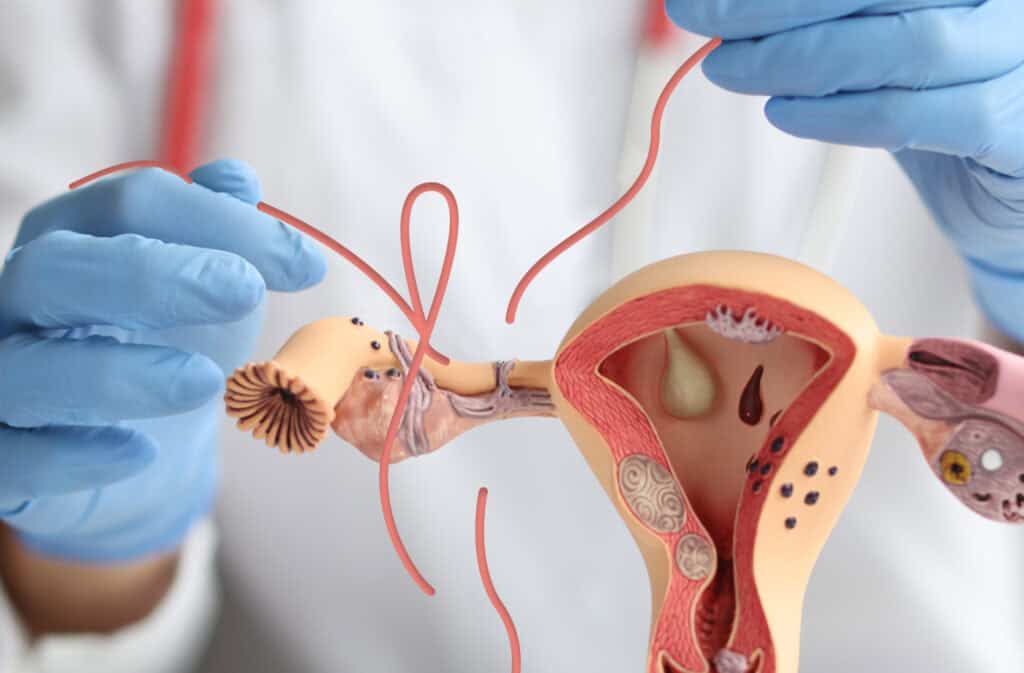
How soon after tubal reversal can I try to conceive? Discover the timeline, success rates, factors that affect conception after tubal reversal, and tips for conceiving.
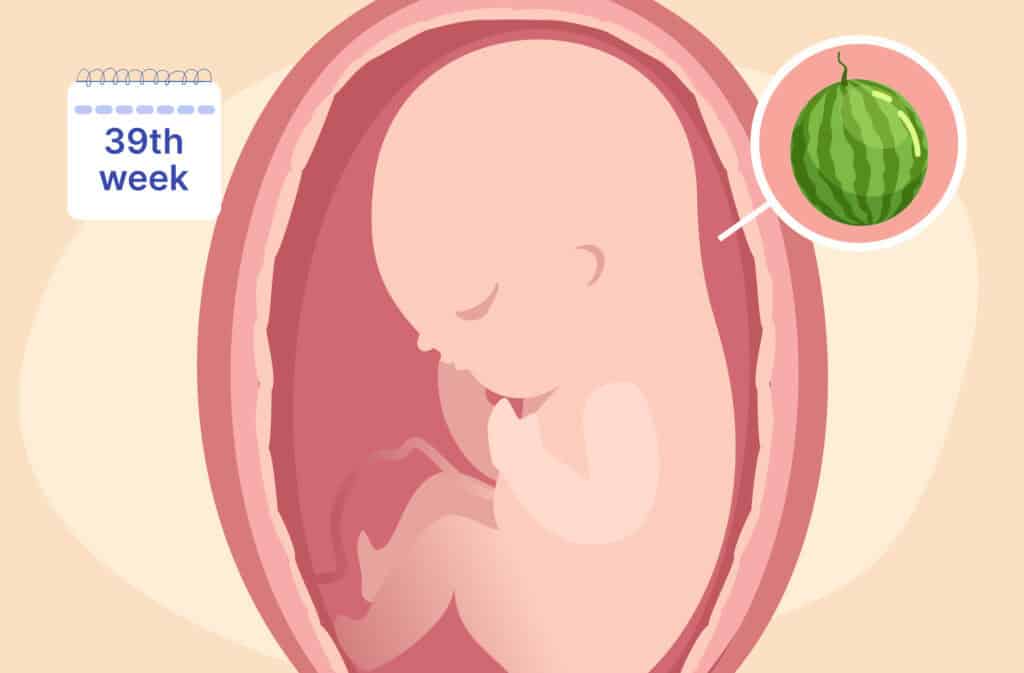
At 39 weeks pregnant, your baby is ready to arrive. Learn about labor signs, discharge, and tips for managing delivery anxiety.
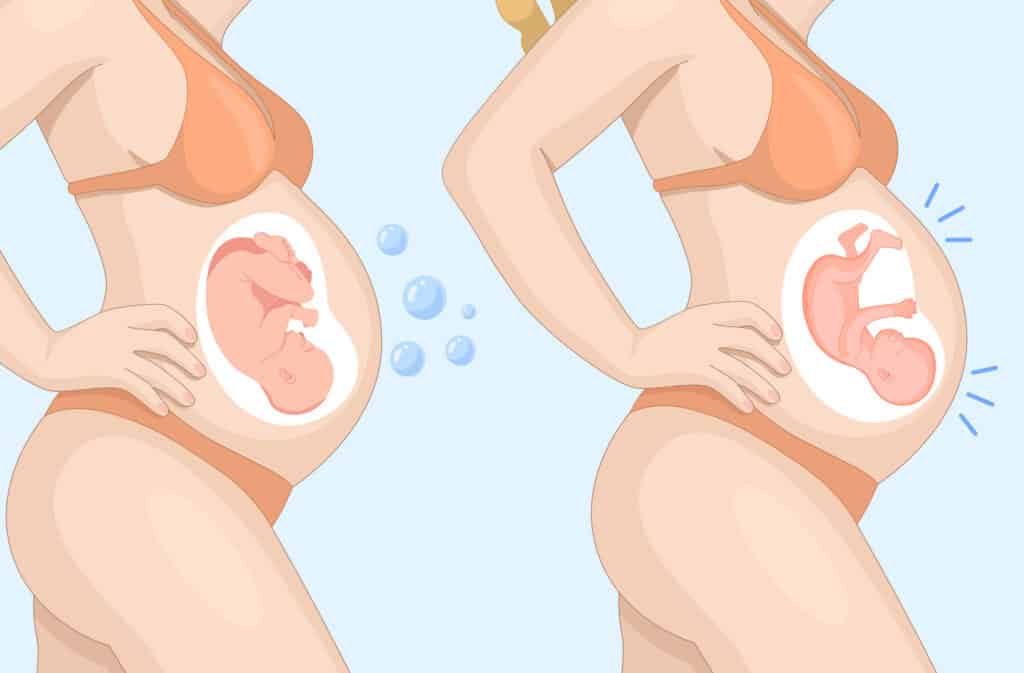
Learn to distinguish between gas bubbles and baby movements during pregnancy. Understand key differences, timing, and when to consult your doctor. Expert advice from Femia.

